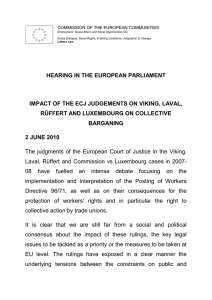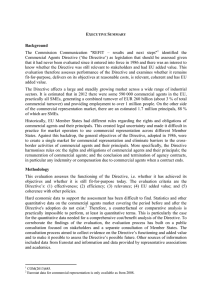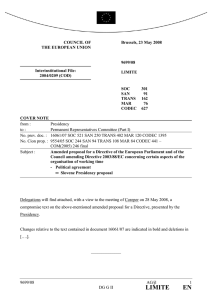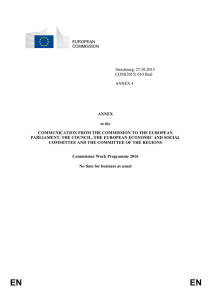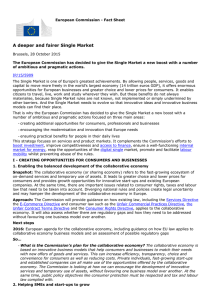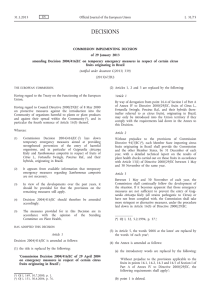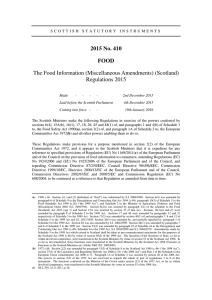EUROPEAN PARLIAMENT
Anuncio
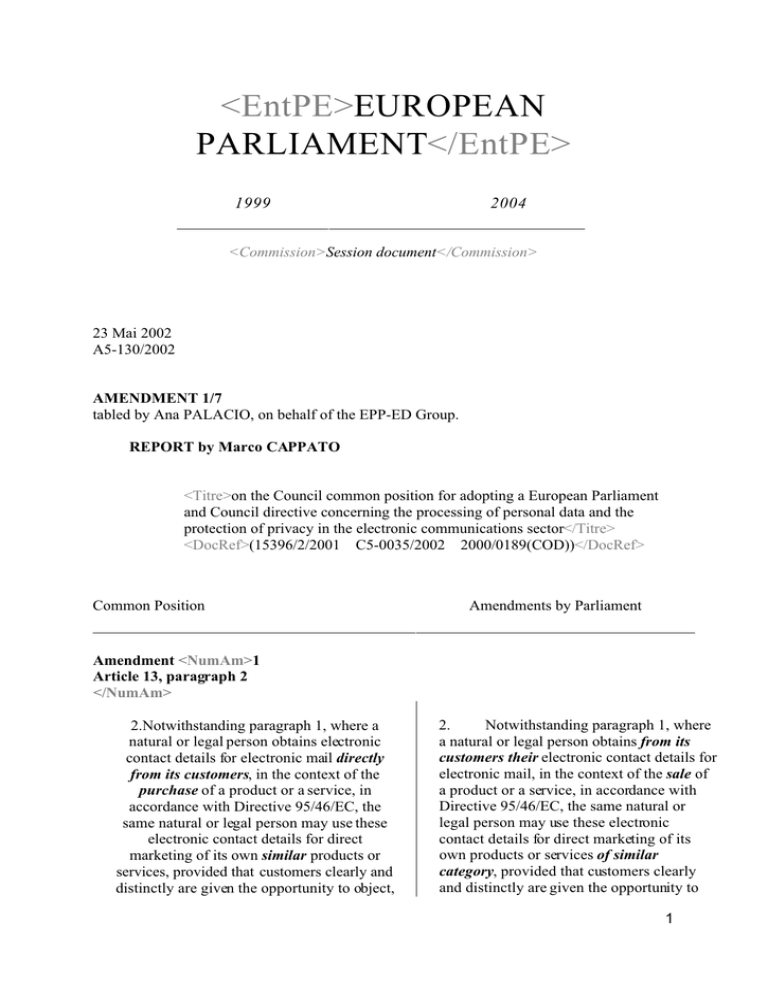
<EntPE>EUROPEAN PARLIAMENT</EntPE> 1999 2004 <Commission>Session document</Commission> 23 Mai 2002 A5-130/2002 AMENDMENT 1/7 tabled by Ana PALACIO, on behalf of the EPP-ED Group. REPORT by Marco CAPPATO <Titre>on the Council common position for adopting a European Parliament and Council directive concerning the processing of personal data and the protection of privacy in the electronic communications sector</Titre> <DocRef>(15396/2/2001 C5-0035/2002 2000/0189(COD))</DocRef> Common Position Amendments by Parliament Amendment <NumAm>1 Article 13, paragraph 2 </NumAm> 2.Notwithstanding paragraph 1, where a natural or legal person obtains electronic contact details for electronic mail directly from its customers, in the context of the purchase of a product or a service, in accordance with Directive 95/46/EC, the same natural or legal person may use these electronic contact details for direct marketing of its own similar products or services, provided that customers clearly and distinctly are given the opportunity to object, 2. Notwithstanding paragraph 1, where a natural or legal person obtains from its customers their electronic contact details for electronic mail, in the context of the sale of a product or a service, in accordance with Directive 95/46/EC, the same natural or legal person may use these electronic contact details for direct marketing of its own products or services of similar category, provided that customers clearly and distinctly are given the opportunity to 1 free of charge and in an easy manner, such use of electronic contact details when they are collected and on the occasion of each message in case the customer has not initially refused such use. object, free of charge and in an easy manner, such use of electronic contact details when they are collected and on the occasion of each message in case the customer has not initially refused such use. </TitreAm> Amendment <NumAm>2 Recital 44 a new </NumAm> (44a) Certain electronic mail systems allow subscribers to view the sender and subject line of an electronic mail, and also to delete the message without having to download the rest of the electronic mail's content or any attachments, thereby reducing costs which could arise from downloading unsolicited electronic mails or attachments. These modalities may continue to be useful in certain cases as an additional tool to the general obligations established in this Directive. 2 Amendment 3 Article 15.1 1. Member States may adopt legislative measures to restrict the scope of the rights and obligations provided for in Article 5, Article 6, Article 8(1)(2)(3) and (4), and Article 9 of this Directive when such restriction constitutes a necessary measure to safeguard national security, (i.e. State security) defence, public security or the prevention, investigation, detection and prosecution of criminal offences or of unauthorised use of the electronic communications system, as referred to in Article 13(1) of Directive 95/46/EC. To this end Member States may inter alia provide for the retention of data for a limited period justified on the grounds laid down in this paragraph, in accordance with the general principles of Community law. 1. Member States may adopt legislative measures to restrict the scope of the rights and obligations provided for in Article 5, Article 6, Article 8(1)(2)(3) and (4), and Article 9 of this Directive when such restriction constitutes a necessary, appropriate and proportionate measure within a democratic society to safeguard national security , (i.e. State security) defence, public security, the prevention, investigation, detection and prosecution of criminal offences or of unauthorised use of the electronic communication system, as referred to in Article 13(1) of Directive 95/46/EC. To this end Member States may inter alia adopt legislative measures providing for the retention of data for a limited period justified on the grounds laid down in this paragraph. All the measures referred to in this paragraph shall be in accordance with the general principles of Community law including those referred to in Article 6 paragraphs 1 and 2 of the Treaty on European Union. Amendment <NumAm>4</NumAm><Article></Article> Considerant 11 (11) Like Directive 95/46/EC, this Directive does not address issues of protection of fundamental rights and freedoms related to activities which are not governed by Community law. Therefore it does not alter the existing balance between the individual's right to privacy and the possibility for Member States to take such measures, as are referred to in Article 15(1) of, necessary for the protection of public security, defence, State security (including the economic wellbeing of the State when the activities relate to State security matters) and the enforcement of criminal law. Consequently, (11) Like Directive 95/46/EC, this Directive does not address issues of protection of fundamental rights and freedoms related to activities which are not governed by Community law.Therefore it does not alter the existing balance between the individual's right to privacy and the possibility for Member States to take the measures referred to in Article 15(1) of this Directive, necessary for the protection of public security, defence, State security (including the economic well-being of the State when the activities relate to State security matters) and the enforcement of 3 this Directive does not affect the ability of Member States to carry out lawful interception of electronic communications or take other measures, if necessary for any of these purposes and in accordance with the European Convention of Human Rights and Fundamental Freedoms. Such measures must be appropriate, strictly proportionate to the intended purpose and necessary within a democratic society. criminal law. Consequently, this Directive does not affect the ability of Member States to carry out lawful interception of electronic communications, or take other measures, if necessary for any of these purposes and in accordance with the European Convention of Human Rights and Fundamental Freedoms as interpreted by the rulings of the European Court of Human Rights. Such measures must be appropriate, strictly proportionate to the intended purpose, and necessary within a democratic society and should be subject to adequate safeguards in accordance with the European Convention on Human Rights and Fundamental Freedoms. 4


